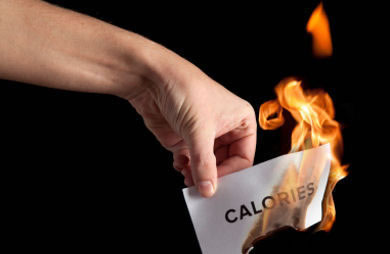|
Out of all the creatures on this planet, only one has the ability to talk itself out of doing what it knows it needs to do. That would be you: homo sapiens. Although this capacity shows up everywhere in human affairs, it is nowhere more extreme or self-defeating than when it is employed by your average dieter. It’s as if, when you go on a diet, something happens to your brain that makes you thoroughly incapable of recognizing even the most flagrant rationalization for what it is. Here’s a classic example, familiar to dieters everywhere: It’s mid-afternoon, and you’ve done well all day at sticking to your diet. But something has come up, and you’ve broken into your secret candy stash for a quick dose of chocolate, your favorite comfort food. Next thing you know, you’re telling yourself: “Well, I’ve already blown my diet for today, so I might as well finish off that candy and start over tomorrow.” Then, it’s off to the local fast food joint for dinner. Obviously, this is a rationalization that makes no real sense. In fact, it’s a pretty flagrant rationalization. You're not merely allowing yourself to overdo it a little with the chocolate, you’re giving yourself permission to make things much worse. Once things have gotten to this stage, there’s very little chance that simple rationality will assert itself and persuade you to get back on plan before serious damage is done. That bus has already pulled out. So, what’s a person to do when this happens? Simple. You have to fight fire with fire. You've probably heard of "aversion" therapy--that's where you take some behavior you're trying to stop and pair it with an immediate negative experience (like an electric shock) so that your brain starts associating that behavior with the negative experience. Alcoholics, for example, sometimes take a drug called Antabuse, which literally makes you sick if you take a drink. This is a little trickier to do when the behavior you want to stop is a mental behavior, like rationalizing your way into doing something dumb, but sometimes using a little imagination and a powerful visual image can do the trick. The first step, though, is to identify the real problem. In our example, the real problem is not that you’re using a rationalization. The real problem, of course, is that you want to keep eating, and that's the thing you need to change. Once you do that, the rationalizations and excuses will disappear on their own. Unfortunately, just telling yourself that your rationalization doesn't really make sense isn't usually enough to change the desire to keep eating into something else. For that, you need to connect the desire itself to some kind of undersirable experience or image, so that your brain will be eager to go somewhere else when it pops up. You could do something like hit yourself in the head whenever the urge to keep eating comes up, but that would be pretty inconsistent with creating a healthy lifestyle–brain damage is rarely healthy. This is where you need to use a little imagination to get the job done. Instead of fighting the urge to keep eating, or telling yourself how dumb it is, try taking it to the extreme, in your mind. Imagine, for a minute, what it would be like to eat continuously, without stopping, and see how that makes you feel. Is that really what you want for yourself? What would the world look like if everyone did that? For those of you who have trouble imagining something like this, here's a link to a video you can use to get your creative juices flowing: Wearable Feedbags Whether this particular image works for you, or you need to create one of your own, you get the idea. Find some image or thought that makes you feel uncomfortable, and bring it to mind whenever you have that urge to keep eating more than you need. It won’t be long until your brain decides it’s not worth it to play this game anymore. |
More From SparkPeople |















